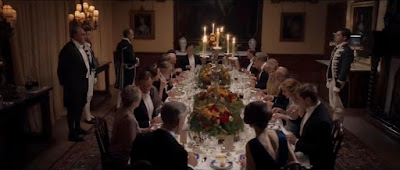Murder By Death (Robert Moore, 1976) Neil Simon was busy in 1976. He'd seen a successful film made of his The Sunshine Boys, his play "California Suite" was opening on Broadway, and he was re-tooling an earlier scrapped screenplay "Bogart Slept Here" (that was to star Marsha Mason and Robert De Niro and be directed by Mike Nichols) to ultimately be released as The Good-bye Girl.
Why, in God's name, he would write a parody of the typical country house mystery during this time is a mystery in and of itself.
However, I suspect the motive was money. Not only that, fellow comedy writer Mel Brooks was making a mint with genre parodies (such as Young Frankenstein), so why not? And if could it generate income as an original work, all the better.
The material is a bit weak, the jokes sometimes thudding, and Simon is at his best doing observational comedy as opposed to sketch-writing, which this essentially is. But, he does have a fine time making fun of some basic mystery tropes, characters and mystery writers, specifically Agatha Christie and Dashiell Hammett."You are cordially invited to Dinner and a Murder at 22 Lola Lane, Saturday evening 7 P.M." says the invitation sent to many prominent detectives. The host is millionaire Lionel Twain (Truman Capote). Using the photo above as reference, the invited guests are socialites Dick and Dora Charleston (David Niven and Maggie Smith), P.I. Sam Diamond and his secretary Tess Skeffington (Peter Falk and Eileen Brennan), amateur detective Jessica Marbles (Elsa Lanchester), Belgian detective Milo Perrier (James Coco)—with chauffeur Cassette (James Cromwell's first movie!)—and Inspector Sidney Wang (Peter Sellers).* The blind butler, Jamessir Bensonmum (Alec Guinness) assists with the help of deaf and dumb kitchen-maid Yetta (Nancy Walker).It's a wonderful cast. One wishes it was just a better movie, starting with the premise: at dinner (after various attempts on their lives) Twain appears and challenges the detectives to a sort of duel: he has come up with a mystery that he believes they cannot solve—a murder is going to occur in the house at midnight and both the killer and the victim are in that room. If the mystery is solved, that sleuth wins $1 million. The group then finds a couple of victims, disappearing bodies, disappearing rooms, and many courses of unchewable dialog and rather stale jokes.But, it also has conflicting stories, made-up alibi's, mutually exclusive excuses, and a double-cross that should have been clever, but is only saved by Alec Guinness' sheer brio in his willingness to get laughs.
Oh, there's a couple of things that work. The mansion's door-bell is Fay Wray's scream from King Kong and that manages to be a consistent laugh just as the horse-scream whenever "Frau Blücher's" name is mentioned worked in Young Frankenstein. There's a nice gag when Nancy Walker's deaf-mute maid runs into the dining room and screams...in total silence. And the cast is uniformly game, but the stand-out is Peter Falk's Sam Diamond, evoking Bogart's gumshoes to a tee.**
Ultimately, Murder By Death merely kills a couple of hours.
* The inspirations for these characters are (of course) Nick and Nora Charles from Hammett's "The Thin Man", Sam Spade from Hammett's "The Maltese Falcon," Agatha Christie's Miss Marple and Hercule Poirot, and Earl Derr Biggers' Charlie Chan.
* The inspirations for these characters are (of course) Nick and Nora Charles from Hammett's "The Thin Man", Sam Spade from Hammett's "The Maltese Falcon," Agatha Christie's Miss Marple and Hercule Poirot, and Earl Derr Biggers' Charlie Chan.
** Falk would get his own sequel of sorts—The Cheap Detective—from the same writer-director team.




















































